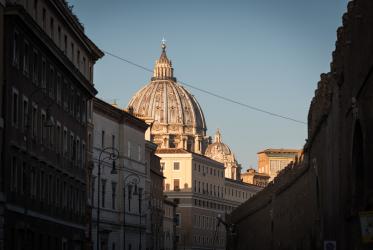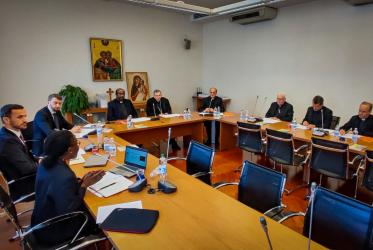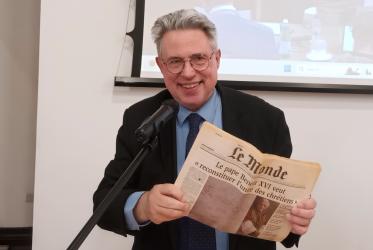Your Holiness,
Grace to you and peace in our Lord Jesus Christ:
For it is the God who said “Let the light shine out of darkness” who has shone in our hearts to give the light of the knowledge of the glory of God in the face of Jesus Christ. But we have this treasure in clay jars, so that it may be made clear that his extraordinary power belongs to God and does not come from us.
– 2 Corinthians 4:6-7
I greet you on behalf of the World Council of Churches, and on my own behalf, to express profound thanks for your ministry and witness to date, and to wish you peace in the Holy Spirit and the experience described by the Apostle Paul when he wrote that, despite any physical weakness we may encounter, “our inner nature is being renewed day by day” (2 Corinthians 4:16).
On the occasion of your resignation from the Apostolic See of Rome and the Petrine ministry, we in the ecumenical movement pause to recall your many contributions to the life of the Church and the world, and to wish you well as your ministry of prayer and meditation continues.
In looking from an ecumenical perspective over your entire service to the Church, the World Council of Churches is grateful for your devotion to the quest for Christian unity as a pattern for the unity of all humanity. You have encouraged a vision of unity in diversity that appreciates the particularities of churches and cultures without sacrificing the common truth that underlies variety of expression. “Churches thus may remain churches and at the same time become one Church”, as you wrote in 1964 during the Second Vatican Council.
Through your Encyclical Caritas in Veritate you have spoken from the depths of a pastoral heart, showing love and concern for individuals and local communities as well as for historic institutions and the whole human family.
Your approach to the visible unity of the One, Holy, Catholic and Apostolic Church distinguishes this goal from the lure of a uniform “world culture” shaped by science and technology. As a Catholic professor of theology serving on the Faith and Order Commission of the World Council of Churches, at a plenary session in Louvain in August 1971, you asked:
Is the Church in the technological world really condemned to be speechless, to a pluralism without communication, to the ghetto? Does she have possibilities to express her unity anew, and thus to make a contribution to the unity of mankind? If uniform formulae are no longer possible, where are the standards by which the inner unity of the unlike can be recognized?
You warned against the “somewhat antagonistic form” of modern culture in the age of “science which describes itself as value-free, yet hands man over to a value-less existence”. You concluded your remarks with this challenge:
By what standards can true humanity be measured? The development of a political ethic poses an urgent task, in which the search for the unity of the Church and for the unity of mankind pass immediately over into one another.
Your voice on that occasion helped to inspire the Faith and Order Commission to focus on “ecclesiology and ethics” in the following decades.
Later, reflecting on Luther and the unity of the Church, you made this further observation:
The ultimate goal of all ecumenical endeavours must of course be to transform the plural of the confessional churches separated from each other into the plural of local churches which in their pluriformity are really one Church.
Your close collaboration with Cardinal Walter Kasper as President of the Pontifical Council for Promoting Christian Unity inspired important chapters in ecumenical thinking and a harvesting of the fruits of dialogue which has continued in your cooperation with Cardinal Kurt Koch.
Since you became Pope, the World Council of Churches has benefited from your partnership in ministry and your support of Catholic representatives in conferences, consultations and such cooperative projects and programmes as the Joint Working Group between the Roman Catholic Church and the World Council of Churches, the Faith and Order Commission, the Commission on World Mission and Evangelism, as well as such independent initiatives as the Global Christian Forum.
It was during your pontificate that the Faith and Order Commission posed the following question in its convergence text The Church: Towards a Common Vision: “If, according to the will of Christ, current divisions are overcome, how might a ministry serving to foster and promote the unity of the Church at the universal level be understood and exercised?”
Throughout your pontificate, you strove daily to live an answer to this question.
My predecessor, Rev. Dr Samuel Kobia, was honoured to attend your inaugural mass in Saint Peter’s Square, and to participate in the celebration of the 100th anniversary of the Week of Prayer for Christian Unity.
I, too, consider it an honour to have met with you in Rome in 2010 and at the 2011 Day of Prayer for Peace in the World in Assisi. Our conversations have left me with a conviction of the importance of strengthening already strong relations that enable Christians of many backgrounds to pray together, work together and rededicate ourselves to unity in faith, witness and service to all people.
We will keep you in our prayers and we ask for your continuing prayers for the advancement of God’s kingdom and the unity of Christ’s Church.
May the Lord bless you and keep you, from this time forth and forevermore,
Rev. Dr Olav Fykse Tveit
WCC general secretary




